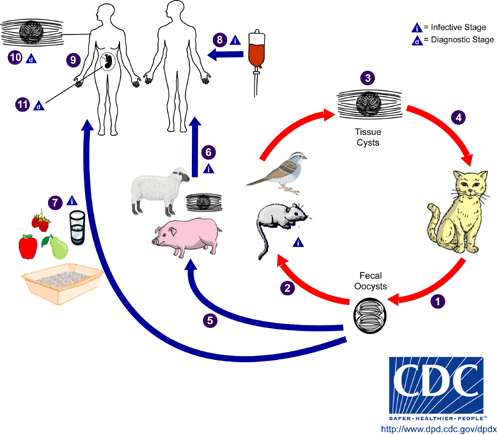
The cat may be cute- but the litter may be deadly
Toxoplasma gondii is a protozoan that infects people – typically from cats. The cats have the cysts in their feces and become mature in birds and rodents. They can quickly go up the food chain and most humans are infected from undercooked meat.
Other sources of contamination include:
- Consuming food or water contaminated with cat feces or from changing a litter box of the pet cat
- Eating undercooked meat from animals that have the cysts
- Wild game
- Blood transfusion or organ transplantation
- Trans placentally from mother to fetus
The Disease:
Healthy people (non-pregnant)
People with an intact immune system are ASYMPTOMATIC because their immune system keeps the parasite from causing problems. Often it is mild “flu-like” symptoms, muscle aches, and tender lymph nodes. The symptoms can last a few weeks but then the immune system keeps the little buggers under control
Mother-to-Child
If the woman is infected prior to becoming pregnant the child is protected from the mother’s immunity. However, newly infected and newly pregnant women can pass the infection to the fetus which can result in miscarriage, stillbirth, or a head that is abnormally large or small. Infants infected before birth may not show signs but later can develop vision loss, mental disability, and seizures.
Compromised Immune Systems
People with HIV, organ transplants, or treated with immunosuppressive drugs like Enbril or Humira can develop fever, confusion, headache, seizures, nausea.
Eye Disease
Toxoplasma infection can result in a congenital eye infection or later infection. It can be an acute inflammatory disease of the retina – manifestations are eye pain, sensitivity to light, tearing, and blurred vision.
Diagnosis
A simple blood test, or observation of the parasite from body fluids.
Treatment
For healthy people a simple combination of drugs. For pregnant women, newborns, and infants there is treatment – although it is not as effective. For people with eye disease there is treatment from the ophthalmologist. Immune compromised individuals may need continual treatment for their entire lives.
Prevention
Food borne transmission can be prevented by careful handling of the meat and avoiding cross contamination. Including cooking to 145 degrees for suspected meats.
Cats are the typical agent and shed millions of the oocytes (eggs) of the parasites. Care in dealing with litter box – and pregnant women should not clean cat litter boxes. If pregnant women have children who deal with kitty litter they need to make certain that the children’s hands are washed.

